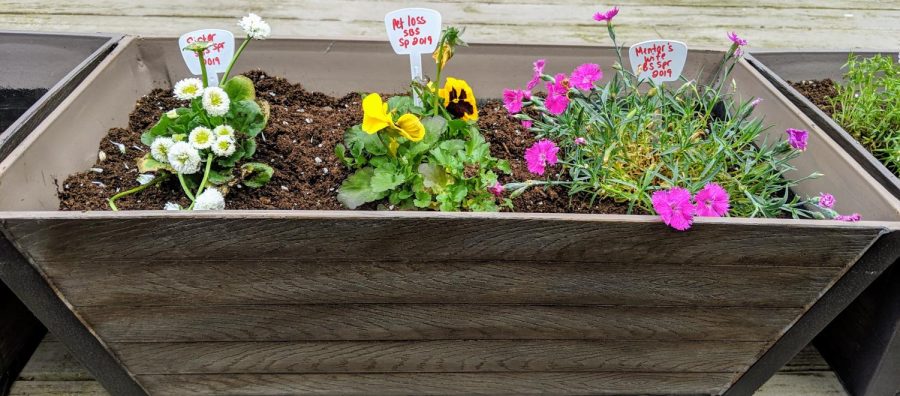Professor turns students’ grief into garden of support
Nine flowers blossom in a row in Rachael Nolan’s backyard. Each honors the life of a Kent State student’s loved one, with an identifier sticking out of the soil behind it: they read, “sister,” “pet,” “mentor’s wife,” among others.
Nolan, a post-doctoral research fellow and adjunct professor in the College of Public Health, asked the students in her “Social Behavioral Science Theories” class if any of them had experienced a loss this semester. Nine students in a class of 42 raised their hand and volunteered to share who they lost.
“I know that my students are experiencing grief,” Nolan said. “I know some of them have dealt with horrific things this semester, unimaginable losses, and I wanted to show them that I cared, and I wanted to allow them to have … their loved ones memorialized by a complete and total stranger, but somebody who absolutely cares about their needs.”
Nolan credits her idea to a discussion of memorial gardens at the Association for Death Education and Counseling Conference, the memorial garden at the University of Akron and a personal loss she experienced during her doctoral program.
Nolan specializes in grief studies, a route she decided to pursue after the traumatic loss of her father.
“It affected all realms of my life,” she said. “It was a trickle-down effect. And I felt, if I’m educated and I have access to all of these resources and I’m having this much of a complicated grief reaction, I can’t imagine what other people who might not have access to these resources might be going through.”
Despite having access to resources of support, Nolan still felt alone. Grievers want to be heard and validated while they are struggling, she said.
“They want to have somebody who cares enough to take a second out of their day to say, ‘I validate you,’” Nolan said. “If I could be that person for the few minutes that I had (them) in class … that’s worth it to me.”
She decided to personalize the project even more to the students by offering to plant a specific type or color of flower that would connect to the person they lost.
“One individual came up to me and said that his dog had passed,” she said. “His dog always rolled around in these yellow flowers, so I memorialized that loss by planting yellow daisies.”
Students raised their hands and told Nolan the relation of the loved one they lost — a relationship loss, a pet loss, a mentor loss, a suicide attempt and more.
Amanda Sape, a sophomore public health major, said Nolan’s class created a “safe zone,” and she felt comfortable enough to raise her hand and tell Nolan she lost her middle school track coach.
“She was basically my mentor, who I looked up to most,” Sape said. “She was the kind of woman I strive to be.”
Nolan’s memorial garden project made Sape feel that Nolan cares about her students as individuals, she said. “I think it’s really neat that she took the time to actually reflect on something that really impacts our own lives,” Sape said.
Nolan plans to continue her project.
“That’s the way that’ll keep me connected not only to my students and that semester, but also connected to the losses that they’ve experienced, which they will carry with them for the rest of their lives,” she said.
Nolan said she hopes that students will be able to talk more openly about their losses and know there are faculty members to support them. She strives to be the support to her students she wished she had while struggling with her own grief.
If you need immediate help or are experiencing a mental health crisis, call the Coleman Professional Services 24/7 helpline for Portage County at 1-877-796-3555 or 330-296-3555.
Alexandra Sobczak is a general assignment reporter. Contact her at [email protected].



